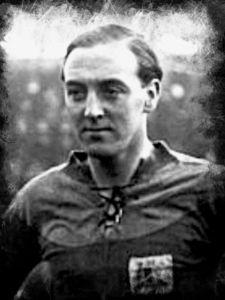 Harold Adrian Walden (1887-1940) was born in Umballa, India on 10 October 1887 and died in Leeds, West Yorkshire on 3 December 1955. A gold medalist at the 1912 Stockholm Olympics, Walden played in seven Football League seasons either side of the First World War, during which he would serve as a soldier in the British Army. After retiring from the game, Walden became a celebrated Music Hall artist and would also appear in a number of films.
Harold Adrian Walden (1887-1940) was born in Umballa, India on 10 October 1887 and died in Leeds, West Yorkshire on 3 December 1955. A gold medalist at the 1912 Stockholm Olympics, Walden played in seven Football League seasons either side of the First World War, during which he would serve as a soldier in the British Army. After retiring from the game, Walden became a celebrated Music Hall artist and would also appear in a number of films.
Early Life
The youngest son of Joseph Walden, a soldier stationed in India with the 2nd Battalion of the Cheshire Regiment, and his wife Annie, Harry Walden joined the same regiment in April 1902 aged just 14-years-old. Having developed into a talented footballer, Walden later played for Belfast sides Cliftonville and Linfield during his posting in Ireland, scoring five goals in six goals for the latter in 1911.
In October 1911, Lance Sergeant Walden decided to leave the Army and paid £25.00 to be released. On his discharge Walden joined newly-formed Halifax Town Amateur Football Club, but would leave just weeks later to play for Bradford City. After making his debut against Notts County on 18 December 1911, Walden would score three of his side’s four goals in the FA Cup replay victory against QPR on 18 January 1912. He then became City’s highest goalscorer in the 1911/1912 season – scoring 11 goals in 17 games. On 19 October 1912, Walden captained the bantams against Chelsea at Stamford Bridge.
Almost certainly, the highlight of Walden’s playing career came when he was selected to play for Great Britain at the 1912 Olympics in Stockholm, Sweden. Having received a ‘bye’ in the first round, Walden scored six goals as his side thrashed Hungary 7-0 in the Second Round to up a Semi-Final clash with Finland. Walden would subsequently score all four goals as Great Britain beat the Fins 4-0.
The Final saw Great Britain play Denmark in front of a crowd of 25,000, including the King of Sweden, Gustav V. Walden opened the scoring with a goal in the 10th minute, before his side went on to secure the Gold Medal win a 4-2 triumph. Walden, ever the ‘livewire’, is reported to have said “Thanks King” on receiving his medal. He still retains the record of ‘Highest British Goal Scorer’ and is the fourth highest on the list of ‘All Time Olympic Goal Scorers’, achieving 11 goals in the tournament.
Walden continued to play for Bradford City, although he suffered cartilage problems in 1913 and finally had surgery in 1914. This would delay his enlistment at the start of the First World War, but he would eventually serve as a Officer in the Bradford Pals. He retuned to Valley Parade after the war and would score four goals in 12 matches during the 1919/20 campaign. On 25 October 1919, Walden scored both goals in a 2-0 win at Arsenal. The London side were suitably impressed and would subsequently persuade him to move to the English capital.
Walden’s time at Arsenal was to prove disappointing, however, and after appearing in just two league matches and four friendlies, Walden returned to Bradford. He had scored one league goal and three in friendlies. After being presented with a cheque by Bradford City (amount unknown), Walden finally called time on his playing career.
First World War Service
Walden took the decision to re-join the Army in April 1915 and was commissioned into the 18th (Service) Battalion (2nd Bradford), The Prince of Wales’s Own (West Yorkshire) Regiment as a second-lieutenant. In 1917, he was at Étaples where he again damaged his knee jumping into a trench during training. Walden subsequently returned to Britain and was promoted to captain. Walden would then spend the remainder of the war as an acting adjutant stationed in Hull.
Music Hall Career
In 1919, Walden appeared at a charity Lifeboat appeal at the Alhambra Theatre in Bradford playing the piano and singing. It was to be the start of his new career. The theatre owner, Mr Laidler, was so impressed with Walden that he signed him to appear on the variety bill for one week. Walden was a born humorist and had been well-known for his antics on and off the pitch. Within two years he was topping the bills and would tour extensively in countries such as Australia, China and India. It was during a visit to Australia that he was pushed on stage to fill in for an ill comedian. Walden’s appearance was a roaring success and would would kickstart his career in comedy.
Walden’s act was heavily influenced by his time as a Bradford City player and the Gold Medal he had won in 1912 would be displayed outside theatres where he was performing. He penned several pieces of music for the ukulele and wrote songs such as Only Me Knows Why. This became his signature tune and he also wrote Ronnie the Robin and Mother I’m a Soldier all of which were recorded on 78rpm vinyl.
Walden also enjoyed a minor film career and he played the lead role of Jack Metherill in the 1920 film The Winning Goal which was an adaptation of Harold Brighouse’s play The Game. He would then play himself in the 1948 film Cup Tie Wedding before joining the famous Ernest Binns Arcadian Follies in the 1940’s. Sometime in the early 1950’s Walden’s Gold Medal was sold.
On 3 December 1955, Walden appeared at a charity performance in Harrogate to raise money for the Yorkshire Evening News Christmas Appeal. On his was back from the event, Walden collapsed at Leeds Railway Station and died from a heart attack. He was later buried in the city’s Killingbeck Cemetery. The following is from his Memories of A Comedian written for the Yorkshire Evening News published on the 30 January 1947.
Folk often ask me which part of my life I enjoyed best. Playing centre forward for Bradford City or being a comedian? And to be honest I tell ‘em this: With football it’s 45 minutes each way. Rain, snow or hail. And at the end the crowd gives you the razzberry if they feel that way about things. With Variety it’s only ten minutes each half. With a two hour interval. And a benefit at the end of every week!
CAREER STATISTICAL RECORD
| Season | Club | League Pos | FA Cup | League Games | League Goals | FA Cup Games | FA Cup Goals | ||||||
| 1907/08 | Linfield | ||||||||||||
| 1908/09 | Army | ||||||||||||
| 1909/10 | Northern Nomads | ||||||||||||
| 1910/11 | Linfield | ||||||||||||
| 1910/11 | Halifax Town | ||||||||||||
| 1911/12 | Bradford City | 11th (First Division) | R4 | 17 | 11 | 4 | 3 | ||||||
| 1912/13 | Bradford City | 13th (First Division) | R1 | 16 | 6 | ||||||||
| 1913/14 | Bradford City | 9th (First Division) | R2 | 7 | 1 | ||||||||
| 1914/15 | Bradford City | 11th (First Division) | R4 | 2 | |||||||||
| 1919/20 | Bradford City | 15th (First Division) | R4 | 12 | 4 | ||||||||
| 1920/21 | Arsenal | 9th (First Division) | R1 | 2 | 1 | ||||||||
| 1921/22 | Bradford Park Avenue | ||||||||||||
| Summary | |||||||||||||
| Arsenal | 2 | 1 | |||||||||||
| Bradford City | 54 | 22 | 4 | 3 | |||||||||
| Totals | 56 | 23 | 4 | 3 | |||||||||
Reproduced in part with kind permission from David Pendleton and the Bradford City FC Museum.

